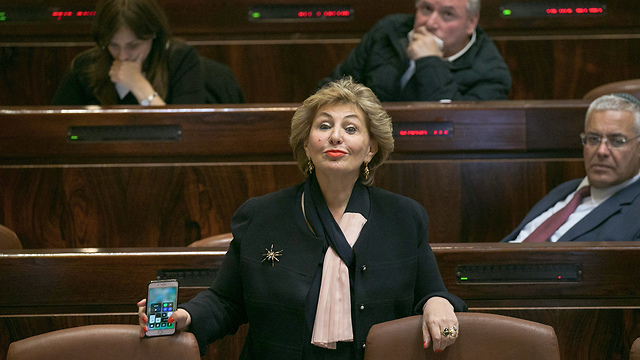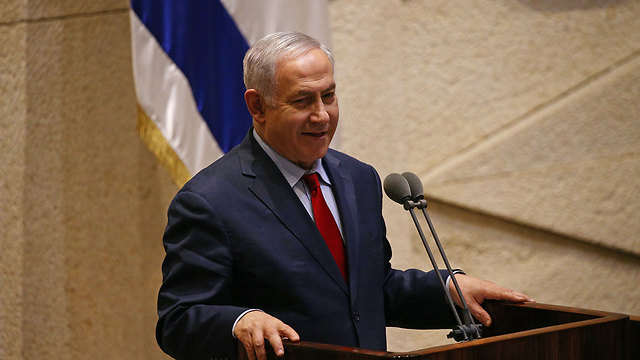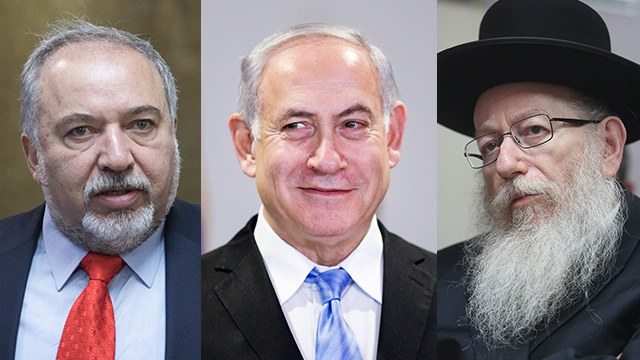

Coalition strikes deal, averting early elections
PM and government ministers overcome most serious internal challenge to the coalition since its formation, as an agreement is unanimously approved by Knesset committee ensuring the Haredi-sponsored IDF draft bill passes its preliminary reading, ministers are given carte blanche to vote as they please, and state budget is rammed through Knesset in all readings; PM mocks opposition: 'If there had been elections I would still be here, and you'd be there.'
The Ministerial Committee for Legislation unanimously approved Tuesday evening a compromise deal regarding the IDF conscription bill designed to exempt Haredim from military service, seeing off the most serious crisis to date that had beset the coalition and threatened to drag the nation into early elections.
The deal managed to strike a delicate balance between the warring parties, ensuring that the conscription bill passed the same evening in its preliminary reading in the Knesset Plenum, but all factions were given carte blanche to vote as they please.
As a result, Immigrant Absorption Minister Sofa Landver (Yisrael Beytenu) was enabled to vote against the bill—as she has threatened to do—without being fired. The decision constituted a departure from a coalition agreement that ministers who vote against its decisions are automatically fired.
Finance Minister Moshe Kahlon’s (Kulanu) 2019 state budget will pass all three readings in the Knesset in the near future, while the nationality bill be brought to a first reading vote no later than Thursday.
The bill passed with a 59 MK majority, with 38 MKs voting against it, including Landver, with no abstentions.
“I promised to continue the existence of the government and I delivered. I am grateful to my partners in the coalition who demonstrated responsibility so that we can continue to lead the State of Israel with determination and success—in security, in the economy, in social matters and in foreign diplomacy,” Netanyahu proudly proclaimed from the podium as he addressed the Knesset Plenum.
Elated with the outcome, the prime minister also turned to members of the opposition—who publicly clamored for elections—and mocked them, insisting that elections would have inevitably resulted in a certain public debasement for them.
“That was scary, eh? The color has returned to your cheeks. I know I have saved you a lot of bitter disappointment because if there were elections I would have returned to this podium and you would have continued to commentate on me from there, because the public support for us is massive,” he said.
Defense Minister Avigdor Lieberman also expressed his pride in result of the back-and-forth negotiations.
“A word is a word. The deal that we stood for all along has been fully accepted. Yisrael Beytenu will vote against the draft-dodging bill,” Lieberman commented.

“Until the beginning of the summer session, a professional team in the Defense Ministry will formulate a bill proposal, which will itself form the basis of a governmental bill, while legislation on religion and state will be frozen. We will continue to stand for the preservation of the status quo.”
“The Ministerial Committee for Legislation unanimously decided to grant freedom to vote to the factions—each party in accordance with the decision of the party chairman—on the conscription bill,” a committee statement read after the meeting, which convened at 6:45pm.
“After the bill is approved in its preliminary reading, the legislative process will continue with the law being incorporated into a Defense Ministry governmental bill agreed upon by all coalition factions and coordinated with Attorney General Avichai Mandelblit,” it continued.
The crisis in the coalition erupted three weeks ago over Haredi parties' insistence to pass an amendment to the IDF draft law that would solicit state recognition of Torah studies to being equal to military service before it lends its support to the 2019 state budget.
The agreement was quickly approved by Kahlon, Education Minister Naftali Bennett and Interior Minister Aryeh Deri, but its fate was still not sealed before Lieberman, Deputy Health Minister Yaakov Litzman and MK Moshe Gafni (UTJ) gave their blessing.
To that end, Prime Minister Netanyahu invited the Haredi MKs to his offices to present the details of the agreement to them, but a UTJ source originally told Ynet that the party will "not consent to a freedom to vote clause, endangering the bill's passage."
Members of the coalition government said earlier that the general feeling is that Netanyahu "regrets" that the ongoing crisis over the IDF draft bill being pushed by Haredi parties may be dragging the nation to early elections.
“Netanyahu has undertaken serious efforts in the last few hours to solve the crisis. The feeling is that he has regrets (what has happened—ed) and doesn’t want to go to elections,” senior coalition officials told Ynet after the prime minister after met with government leaders on Tuesday evening in another bid to stave off early elections.
Minister Landver's threats to shoot down the bill was a key focus for the prime minister and his colleagues since Lieberman had made follow-up threats to torpedo the coalition if she was fired for the move. Seeking to avoid almost certain elections, Netanyahu asked other faction heads in the coalition to commit to accepting Landver's vote and not demanding that she be fired.
Earlier, while stressing that "going to elections is wrong for Israel and wrong for Yisrael Beytenu," Lieberman, the party's leader, said that if Netanyahu decides to fire Landver for voting against the legislation, "then of course we're heading for elections."
"You can't expect Yisrael Beytenu to vote in favor of the draft law, just like you can't expect Shas to vote for buses on Shabbat,” Lieberman said at a conference in Airport City
"When it comes to state security, we cannot compromise. This bill is the wrong thing for the State of Israel. It perpetuates the tensions, perpetuates poverty (in the Haredi sector). The ball is in the prime minister's court. We'll know exactly where we're heading after the vote."
Terms of agreement
1. The Ministerial Committee for Legislation will discuss Minister Sofa Landver's appeal Tuesday and reach a decision that carte blanche freedom to vote will be afforded to all coalition parties on Shas MK Yoav Ben-Tzur's bill according to the position set by their party leader, subject to two conditions:
A. All MKs in a party will vote according to the position set by their party head.
B. Each party chairman will notify the coalition chairman of their decision within 30 minutes from the committee adjourning its meeting. Should such notification not be given, party chairmen will be considered to have ordered their party members to vote in favor of the bill.
2. The defense minister will submit to the Ministerial Committee for Legislation at the start of the Knesset's summer session a government bill on IDF conscription, in accordance with recommendations made by a Defense Ministry committee on the matter, no later than four weeks following the session's opening.
After the governmental bill is approved in the Ministerial Committee for Legislation and moved to a first Knesset reading, it will be incorporated with MK Ben-Tzur's bill in preparation for its second and third readings.
The second and third reading text will be consolidated with the assent of all coalition partners.
3. Coalition members will be barred from submitting private or governmental bills, or bills from a Knesset committee on religion and state affairs, to the Ministerial Committee for Legislation. Similarly, no demand will be made to promote such bills, including bills already before the Knesset.
The above will not apply to new issues stemming from a High Court ruling being made after the agreement's promulgation.
4. Voting on the nationality bill's first reading will take place after the 2019 budget is voted on. If the nationality bill cannot be placed on the agenda immediately following the budgetary vote, it will be the first bill voted on in the first day of the summer session.


















